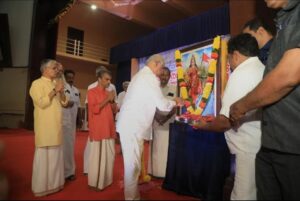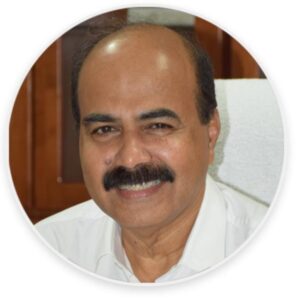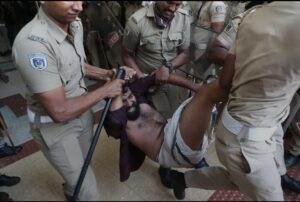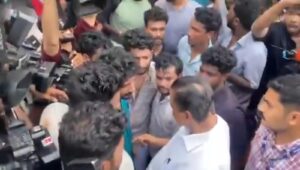With protests swelling and legal battles looming, the crisis at the University of Kerala has yet again underscored the troubles connected with the politicisation of the state's higher education space.
Published Jul 09, 2025 | 12:49 PM ⚊ Updated Jul 09, 2025 | 12:49 PM

University of Kerala.
Synopsis: The University of Kerala is currently dealing with a bizarre administrative standoff as it is operating with two Registrars at the same time — one reinstated by the Syndicate and another appointed by the Vice-Chancellor.
It’s total pandemonium at one of India’s oldest — and Kerala’s oldest — higher education institutions, the University of Kerala. The university is currently dealing with a bizarre administrative standoff as it is operating with two Registrars at the same time.
The result? From student affairs to crucial decisions, files are stuck, tempers are flaring, and protests are swelling. To make matters worse, there is a wave of protests by student organisations alleging the Governor’s crude moves towards flexing his muscles and his ulterior motives towards saffronisation.
As this curious two-registrar saga and student protests unfold, Kerala’s much-touted ‘Study in Kerala’ pitch also takes a serious credibility hit, with one of the state’s premier institutions struggling to keep its own house in order.
It was a controversy that began on 25 June at the University of Kerala’s Senate Hall, which culminated in the suspension of its Registrar, Prof Dr KS Anil Kumar, following high drama surrounding the display of a Bharat Mata portrait.
The event, organised by Padmanabha Seva Samithi to mark the anniversary of the Emergency, was scheduled to be inaugurated by the Governor.

Governor Rajendra Vishwanath Arlekar at the event, organised by Padmanabha Seva Samithi at University Senate Hall on 25 June.
However, moments before his arrival, protests erupted from the Students’ Federation of India (SFI) activists and other groups over a portrait of Bharat Mata holding a saffron flag displayed at the venue.
Citing the use of religious symbolism in a secular academic space, the Registrar hurriedly revoked permission for the programme and informed both the Director General of Police (DGP) and Kerala Raj Bhavan — allegedly while the Governor was already at the venue participating in the event.
An internal inquiry later allegedly found that the Registrar acted prematurely, without verifying whether the image violated university rules, which prohibit religious prayers and speeches but not specific images.
The Vice-Chancellor (in-charge) Dr Mohan Kunnummal, termed the action an affront to protocol, especially as it occurred while the national anthem was being played.
Acting on the inquiry’s recommendations, Kunnummal invoked Section 10(13) of the Kerala University Act, 1974 and suspended Anil Kumar on 2 July for “wilful disobedience, insubordination, and dereliction of duty”.
The Vice-Chancellor called for a full-fledged investigation, citing the incident as one that tarnished the university’s credibility. An interim order by the Vice-Chancellor also assigned the responsibilities of the Registrar to Director (Planning and Development) Mini Dejo Kappen.

Prof (Dr) KS Anil Kumar
The suspension immediately triggered sharp reactions from the state government and Opposition leaders, who termed the move arbitrary and politically motivated.
Higher Education Minister R Bindu strongly criticised the decision, calling it a blatant violation of university rules.
“There is no provision in the University Act, statutes, or regulations allowing the Vice-Chancellor to unilaterally suspend the Registrar. Only the Syndicate, being the appointing authority, can take disciplinary action,” she asserted.
Bindu alleged that the Vice-Chancellor’s decision seemed ideologically driven, accusing him of aligning with Rashtriya Swayamsevak Sangh-backed initiatives.
Left-affiliated Syndicate members also condemned the Vice-Chancellor’s move, warning that any action not ratified by the Syndicate would be invalid.
They accused Kunnummal of misusing his authority and bypassing established procedures.
Leader of the Opposition in Kerala Assembly VD Satheesan said the Vice-Chancellor’s decision was legally untenable and called upon the Governor, who serves as the Chancellor of the university, to intervene responsibly. He also questioned the chief minister’s silence on the matter.
General Education Minister V Sivankutty joined the criticism, clarifying that while Rule 10 (13) of the Kerala University Act permits certain actions, Rule 10 (14) restricts the Vice-Chancellor’s authority to officials below the rank of deputy registrar.

Prof.(Dr.) Mohanan Kunnummal, VC, University of Kerala
Three days after the Vice-Chancellor ordered Anil Kumar’s suspension, the Syndicate met on 6 July with a single-point agenda — to finalise the statement of facts on the suspension for submission before the High Court on 7 July.
It’s said that pro-Left members demanded the suspension itself be discussed. When the VC denied the request, citing it wasn’t on the agenda, heated arguments followed.
The Vice-Chancellor eventually called off the meeting and walked out.
Unfazed, the Syndicate members continued deliberations, appointed a new chairperson from among themselves, and unanimously revoked Anil Kumar’s suspension.
A three-member panel was also formed to probe the events leading to his suspension.
Dr Ciza Thomas, who also holds additional charge as Kerala University VC on the Governor’s directive, dismissed the move as invalid, stating no decision taken after the official dispersal of the meeting holds legal ground.
Thomas, the Vice-Chancellor of the Digital University, was given additional charge as the incumbent VC (in-charge) Mohanan Kunnummal, who flew to Russia.
Later that evening, Anil Kumar returned to the office, signalling he may withdraw his petition against the suspension in the high court. Higher Education Minister Bindu, however, backed the Syndicate’s authority to revoke the suspension as per university statutes.
Anticipating that Anil Kumar would rush to the Kerala High Court armed with the Syndicate’s decision, Thomas prepared her legal arsenal.
She engaged a senior counsel to represent her in the registrar’s suspension case listed for hearing on 7 July.
As predicted, Anil Kumar’s counsel appeared before the Bench of Justice DK Singh and promptly sought to withdraw the petition challenging his suspension, citing the Syndicate’s move on 6 July to revoke it.
But the drama wasn’t over. Thomas’s senior counsel objected, flagging that the legality of the Syndicate’s decision itself was questionable.
Justice Singh took note, observing that the correctness of that decision must be examined by the appropriate authority.
Ultimately, the court dismissed Anil Kumar’s petition as withdrawn — leaving the core issue hanging in the balance, awaiting its next legal battle.
In between, the officer who was given charge of the Registrar, Mini Dejo Kappen, desisted from assuming charge, citing the absence of an order for the same.
The ongoing administrative standoff at the university has taken a complex turn, with the institution effectively having two Registrars — one reinstated by the Syndicate and another appointed by the Vice-Chancellor.
Anil Kumar, whose suspension was revoked by the university Syndicate, enjoys the backing of the state government.
However, Thomas, in her capacity as Chancellor, took the stance that he didn’t have the right to resume his duties as his reinstatement itself was contentious.
At the same time, Director (Planning and Development) Mini Dejo Kappen, who was given the charge of Registrar declined to assume charge, citing the lack of a formal office order.
The legal tangle deepened after the high court observed that the validity of the Syndicate’s decision to revoke the suspension should be determined by the appropriate authority, in other words, the Governor himself.
With Raj Bhavan now considering options — including nullifying the Syndicate decision — a confrontation between the state government and the Governor appears imminent, with both sides preparing for a potential legal battle.
In another development, in a fresh directive, Thomas instructed Joint Registrars to send all files directly to her, bypassing Anil Kumar’s office.
It’s learnt that the Vice-Chancellor has refused to acknowledge any files processed or forwarded by Anil Kumar, despite his reporting for duty based on the Syndicate’s decision.
Adding to the tension, Raj Bhavan is reportedly contemplating disciplinary action against Joint Registrar P Harikumar, who allegedly defied the Vice-Chancellor’s authority by participating in the Syndicate meeting after it had been formally adjourned. With the Governor now holding the decisive authority, the crisis within the university’s administration remains far from resolved.

An SFI supporter who barged into the administrative block of the University of Kerala was removed by the police on 8 July.
The ongoing standoff in the university’s administrative hierarchy has started affecting its daily functioning, with confusion prevailing over file clearances and decision-making responsibilities.
Sources within the university say there’s a lack of clarity on procedural routes.
Though Anil Kumar continues in the Registrar’s chair, he has reportedly refrained from taking decisions — both administrative and academic — fully aware of the contentious nature of his reinstatement.
Matters got murkier after his official digital login credentials were reportedly blocked immediately following his suspension, leaving a leadership vacuum.
What makes the situation graver is its direct impact on students, especially with undergraduate and postgraduate admissions currently underway in colleges under the university.
Traditionally, the Registrar heads key committees related to admissions and handles routine, yet critical, decisions — including computerised allotment issues, profile corrections, and mark verifications.
“With no clear command chain, even minor changes like correcting a student’s name or updating marks are getting delayed,” said a source.
In one instance, a file seeking urgent equivalency recognition for a Panjab University degree, routed through Anil Kumar’s office, was promptly returned by the Vice-Chancellor, who instructed the Joint Registrar to send it directly to her. The Vice-Chancellor later cleared the certificate herself — a rare move reflecting the present administrative disorder.
For now, students and staff alike remain caught in the crossfire of an unresolved power tussle.
At the same time, the university witnessed fresh turmoil on 8 July as SFI, the CPI(M)’s student wing, staged dramatic protests against the suspension of Anil Kumar, barging into the University of Kerala’s administrative block and vowing to continue their agitation.
CPI(M) State Secretary MV Govindan also visited the protesting students, giving the impression that the protests have government patronage.

CPI(M) State Secretary MV Govindan having a chat with protesting students at the University of Kerala on 8 July.
Satheesan slammed the government, accusing it of turning universities into AKG Centre — CPI(M) headquarters — outposts while the Sangh Parivar sought to saffronise education.
He said the government-Raj Bhavan power struggle had plunged campuses into chaos, with 12 of 13 universities lacking full-time Vice-Chancellors.
Satheesan accused both sides of destroying the sector through personal vendettas, citing arbitrary suspensions and appointments. He said students were the ultimate victims, forced to migrate for quality education.
Calling for an urgent end to the infighting, he alleged the chief minister remained silent, unwilling to confront the Governor, who once acted as a middleman for the CPI(M)-BJP nexus.
As Kerala’s oldest university sinks deeper into administrative anarchy, what ought to have been a seat of learning has turned into a political battlefield.
With protests swelling and legal battles looming, the crisis at the University of Kerala has yet again underscored the troubles connected with the politicisation of the state’s higher education space.
Amid portraits, protocols, and power struggles, the core mission of the university — facilitating education — lies forgotten.
(Edited by Muhammed Fazil.)

